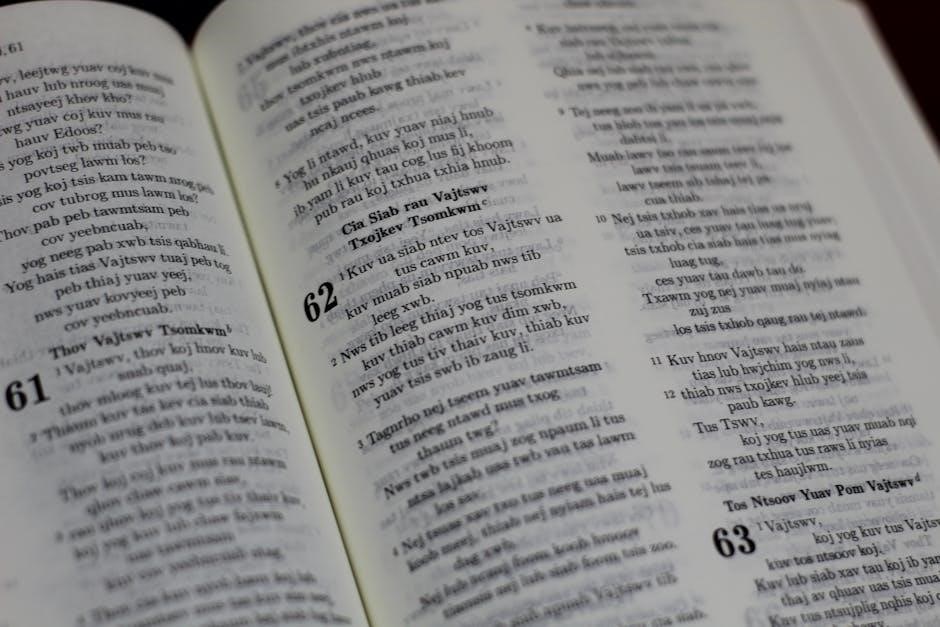The Big Book Study Guide is a comprehensive tool designed to enhance understanding of Alcoholics Anonymous’ core text. It offers structured analysis and practical applications for individuals and groups, fostering deeper engagement with the recovery principles outlined in the Big Book.
Purpose of the Study Guide
The Big Book Study Guide is designed to help individuals and groups deepen their understanding of the principles and practices outlined in Alcoholics Anonymous’ foundational text. Its primary aim is to provide a structured approach to studying the Big Book, ensuring that readers grasp the core messages and apply them effectively in their recovery journey. By breaking down complex concepts into manageable sections, the guide facilitates a thorough exploration of the 12 Steps and related teachings. It serves as both an educational tool and a reference for those seeking clarity and guidance, ultimately aiding in the practical application of the program’s principles to achieve lasting sobriety and spiritual growth.
Target Audience
The Big Book Study Guide is primarily designed for individuals seeking to deepen their understanding of Alcoholics Anonymous’ principles and practices. It caters to newcomers who may find the Big Book complex, as well as experienced members aiming to reinforce their knowledge. The guide is also beneficial for sponsors guiding others through the recovery process. Additionally, it serves individuals struggling with addiction or those supporting loved ones in recovery. By providing structured content, it addresses diverse learning needs, ensuring everyone can engage with the material effectively. Its universal appeal makes it a valuable resource for both personal and group study, fostering a clearer path to sobriety and spiritual growth.

Structure of the Big Book Study Guide
The guide features comprehensive sentence analysis, question-based learning, and visual aids, ensuring a thorough understanding of the Big Book’s content through organized and engaging study methods.
Comprehensive Sentence Analysis
The Big Book Study Guide offers a detailed examination of nearly every sentence in the Alcoholics Anonymous text. Each sentence is analyzed to uncover its meaning and relevance to recovery. This approach ensures that readers grasp the underlying principles and practical applications of the program. Questions are posed to stimulate reflection and encourage a deeper understanding of the material. Handouts and visual aids complement the analysis, providing additional context and clarity. By breaking down the text into manageable parts, the guide helps users avoid confusion and fully engage with the content. This methodical approach fosters a thorough comprehension of the Big Book, making it easier to apply its teachings in real life.
Question-Based Learning Approach
The Big Book Study Guide employs a question-based learning approach to facilitate deeper engagement with the material. By converting key sentences into questions, readers are prompted to think critically about the content. This method encourages active participation and reflection, helping users apply the principles to their personal recovery journey. The questions are designed to clarify complex concepts and reinforce understanding. They also serve as a tool for discussion in group settings, fostering collaboration and shared insights. This interactive approach ensures that learners move beyond passive reading, actively engaging with the text to uncover its transformative potential. Regular use of these questions enhances retention and application of the Big Book’s teachings.
Visual Aids and Handouts
The Big Book Study Guide incorporates visual aids and handouts to enhance understanding and retention of the material. These resources, while not officially endorsed by AA, are designed to complement the Big Book’s content. They include charts, diagrams, and summaries that break down complex concepts into digestible formats. Handouts often highlight key points, making it easier for individuals and groups to follow along during studies. These tools are particularly useful for visual learners and can be downloaded for personal or group use. They serve as valuable supplements to the text, aiding in the practical application of the recovery principles outlined in the Big Book. Regular use of these materials can deepen one’s connection to the program and its teachings.
History and Development
The Big Book Study Guide evolved from a need to clarify and deepen understanding of Alcoholics Anonymous’ core text. Developed by dedicated contributors, it has grown into a vital resource for members seeking structured study materials, blending historical insights with practical applications to enhance recovery journeys.
Origins and Evolution
The Big Book Study Guide originated from the need to provide a clearer understanding of Alcoholics Anonymous’ foundational text. It began as informal study materials created by members who sought to deepen their grasp of the program. Over time, these resources evolved into structured guides, incorporating sentence-by-sentence analysis and question-based learning. The guide gained popularity as it helped bridge gaps between the book’s content and individual interpretations. Contributors, including experienced members and sponsors, played a crucial role in refining the guide, ensuring it remained aligned with AA’s principles. Its evolution reflects the collective effort to make the Big Book more accessible and impactful for those seeking recovery.
Contributors and Key Figures
Key contributors to the Big Book Study Guide include dedicated members of Alcoholics Anonymous who recognized the need for deeper understanding of the program. Notable figures like Wesley P. and John W. from the Workshop Group in Pompano Beach, FL, played pivotal roles in developing structured study materials. Their efforts laid the foundation for the guide’s question-based approach, transforming sentences from the Big Book into study questions. Sponsors and experienced members also contributed significantly, offering insights and guidance that enriched the guide’s content. These individuals, driven by a commitment to recovery, ensured the guide remained faithful to AA’s principles while making it more accessible to those seeking sobriety. Their contributions have profoundly impacted the effectiveness of the study guide for countless members.
Methods of Using the Study Guide
- Individual study: Personal analysis of each sentence and answering questions to deepen understanding.
- Group study: Collective discussions and shared insights to foster collaboration and mutual learning.
- Audio book studies: Guided presentations covering key steps to enhance comprehension and engagement.
Individual Study
Individual study with the Big Book Study Guide allows for a personalized and in-depth exploration of the material. Users can engage in sentence-by-sentence analysis, answering questions to clarify their understanding of the text. This method encourages reflection on personal experiences and how they align with the principles outlined in the Big Book. By focusing on specific sections and completing related exercises, individuals can identify key concepts and apply them to their recovery journey. The guide also provides structured routines, such as daily reading and note-taking, to help individuals stay consistent and motivated; This approach fosters accountability and introspection, making it an effective way to grasp the program’s fundamentals and achieve personal growth. Many find this method particularly beneficial for developing a strong foundation in the 12-Step program and its spiritual principles.

Group Study
Group study using the Big Book Study Guide provides a structured and collaborative environment for exploring the material. Meetings typically involve reading specific sections of the Big Book aloud, followed by discussions and question-and-answer sessions. This format encourages participants to share insights, experiences, and perspectives, fostering a deeper understanding of the text. Group study also promotes accountability and mutual support, as members motivate and learn from one another. Many groups utilize visual aids and handouts to enhance comprehension and engagement. This collective approach not only strengthens individual knowledge but also builds a sense of community and shared purpose, making it a powerful complement to individual study and the overall recovery process.
Audio Book Studies
Audio book studies offer a convenient and accessible way to engage with the Big Book Study Guide. These studies are typically recorded sessions where a presenter reads and discusses specific sections of the Big Book, guiding participants through its principles and applications. Designed to complement individual or group study, audio book studies provide a structured learning experience, especially for those who prefer auditory learning or have busy schedules. Many recordings are available online, offering flexibility and consistency. They are particularly beneficial for newcomers, as they provide clear guidance and help bridge gaps in understanding the program. Audio book studies also serve as a valuable resource for those unable to attend in-person meetings, ensuring access to the recovery material anytime, anywhere.

The Twelve-Step Program
The Twelve-Step Program is a foundational framework for recovery, emphasizing personal growth and spiritual awakening through structured, sequential principles guiding individuals toward lasting sobriety and transformation.
Overview of the 12 Steps

The Twelve Steps are a structured program for recovery, outlined in the Big Book, designed to help individuals achieve spiritual awakening and lasting sobriety. Each step builds on the previous, guiding participants through self-reflection, accountability, and spiritual growth. The process begins with admitting powerlessness and ends with carrying the message to others. These steps are formulaic, requiring sequential completion to achieve the desired transformation. The program emphasizes personal responsibility, amends, and service, fostering a deeper connection to a higher power. By following these principles, individuals can overcome addiction and embrace a fulfilling, purpose-driven life. The steps are universal, applicable to all seeking recovery, regardless of background or circumstances.
Importance of Sequential Progression
The Twelve Steps must be followed in sequence to ensure a thorough transformation. Each step builds on the previous one, creating a foundation for spiritual growth and lasting recovery. Skipping steps can lead to misunderstandings and incomplete progress. The program is designed like a formula, where each action prepares you for the next, much like dialing a phone number requires the correct sequence to connect. Sequential progression ensures that individuals confront their flaws, make amends, and develop a relationship with a higher power in a logical and effective manner. This structured approach has historically proven successful, as seen in the recovery of the first 100 alcoholics who followed the steps in order. Adhering to this sequence is essential for achieving the desired spiritual awakening and sobriety;
Role of Sponsors
Sponsors play a vital role in guiding individuals through the Big Book Study Guide and the Twelve-Step program. They provide personalized support, clarifying concepts and helping applicants apply the principles to their lives. Sponsors share their own experiences, offering insights and encouragement, which strengthens the recovery journey. Their guidance ensures a deeper understanding of the material, helping individuals overcome challenges and stay motivated. Sponsors also facilitate step-by-step progression, ensuring the program is followed effectively. Their role is instrumental in fostering spiritual growth and helping individuals achieve long-term sobriety by walking them through the Big Book page by page and reflecting on their experiences.

Resources and Tools
The Big Book Study Guide offers essential materials, including handouts, visual aids, and downloadable forms like Step Four. Audio book studies and online support communities are also available.
Essential Study Materials
The Big Book Study Guide provides a range of essential materials to deepen understanding and application of the program. These include detailed handouts, visual aids, and structured forms like the Step Four inventory. Additionally, a comprehensive guide covers nearly every sentence in the Big Book, offering insights and questions to facilitate reflection. Audio book studies are also available, featuring presentations that guide participants through the text. These resources are designed to complement the core teachings, making the recovery process more accessible and engaging for both individuals and groups. They support a thorough exploration of the Twelve Steps and the principles outlined in the Big Book.
Additional Reading and References
Additional reading and references complement the Big Book Study Guide, offering deeper insights into recovery principles. The Big Book Q&A serves as a valuable reference tool, helping users improve their understanding of the core text. Workshops and online communities provide further learning opportunities, while Step Four forms and other structured documents aid in applying the teachings. These resources encourage a holistic approach to the program, fostering spiritual growth and practical application. They are designed to support both individual and group studies, enhancing the overall recovery journey and promoting a richer understanding of the Twelve Steps and related materials.
Online Support and Communities
Online support and communities play a vital role in enhancing the Big Book Study Guide experience. Websites like thebigbookstudy.net offer free resources, including audio studies and downloadable materials, to facilitate deeper understanding. Online forums and groups provide spaces for sharing experiences and receiving support from others on the recovery journey. These platforms foster connection and motivation, helping individuals stay committed to their studies. Additionally, virtual workshops and presentations allow participants to engage with the material in structured sessions. The availability of these digital tools ensures accessibility for those who may face challenges in attending in-person meetings, making the recovery process more inclusive and supportive. Online communities also offer guidance and encouragement, reinforcing the principles outlined in the Big Book Study Guide.

Real-Life Applications
The Big Book Study Guide offers practical tools for real-life situations, providing evidence of transformation through success stories and testimonials. It equips individuals to apply recovery principles effectively.
Success Stories and Testimonials
Countless individuals have shared powerful testimonials about the Big Book Study Guide, highlighting its transformative impact on their recovery journeys. Many credit the guide for helping them grasp the core principles of the 12-step program, leading to profound spiritual awakenings and long-term sobriety. For example, one member shared how the guide’s structured approach enabled them to overcome initial confusion and fully engage with the Big Book’s teachings. Another testimonial emphasized the guide’s practical tools, such as sentence-by-sentence analysis, which made the text relatable and actionable. These success stories underscore the guide’s effectiveness in fostering personal growth and providing a clear path to recovery for both newcomers and long-time members alike.
Case Studies
Case studies highlight the practical application of the Big Book Study Guide in real-life recovery journeys. One group reported a significant increase in member engagement and understanding after implementing the guide, with participants noting improved retention of key concepts. Another study focused on individuals who struggled with the Big Book’s complex language, demonstrating how the guide’s structured approach helped them break down barriers to comprehension. A notable case involved a member who, after using the guide, experienced a profound shift in perspective, moving from denial to acceptance of their addiction. These examples illustrate the guide’s ability to tailor the recovery process to individual needs, fostering meaningful progress and spiritual growth.

Step-by-Step Study Process
The guide offers a systematic approach to studying the Big Book, with daily reading assignments, weekly reflection exercises, and structured steps to ensure steady progress and accountability.
Daily Study Routine
A daily study routine is essential for consistent progress. Allocate 25-minute focused sessions, starting with reading assigned sections of the Big Book. Summarize key points to reinforce understanding. Reflect on personal experiences related to the material, exploring how concepts apply to your life. Engage with provided worksheets or questions to deepen insights. Discuss findings with a sponsor or group for accountability and clarification. Consistency fosters spiritual growth and practical application of recovery principles. Over time, this routine builds a strong foundation for long-term sobriety and personal transformation. Regular review and reflection ensure steady advancement through the program.
Weekly Goals and Milestones
Setting weekly goals helps maintain steady progress in the Big Book Study Guide. Begin by identifying specific chapters or themes to focus on, creating a clear plan for each day. Break down larger sections into manageable parts to avoid overwhelm. Use the provided worksheets or questions to track your understanding. Reflect on key insights and how they apply to your personal journey. By the end of the week, review accomplishments and areas needing more attention. Adjust goals as needed to stay on track. Celebrating milestones, no matter how small, reinforces motivation and commitment to the recovery process. Consistent effort leads to meaningful growth and deeper comprehension of the material.

Common Challenges
Common challenges include difficulty understanding complex concepts, maintaining consistent study discipline, and overcoming initial confusion about the program’s principles and application.
Overcoming Misunderstandings
Overcoming misunderstandings is crucial for effective study of the Big Book. Many newcomers struggle with interpreting spiritual concepts or reconciling the program with personal beliefs. Sponsors play a key role in clarifying doubts, but some may lack deep understanding themselves. Structured study guides help break down complex ideas into digestible parts, reducing confusion. Active participation in discussions and consistent reading are essential for clearing misconceptions. Highlighting and reflecting on key passages can also aid in grasping the material. Misunderstandings often arise from rushed or superficial reading, so patience and thorough analysis are vital. By addressing these challenges methodically, students can gain a clearer understanding of the program’s principles and application.
- Highlight and reflect on key passages to clarify doubts.
- Engage in discussions to gain new perspectives.
- Use visual aids to simplify complex concepts.
Maintaining Motivation
Maintaining motivation is essential for consistent progress through the Big Book Study Guide. Setting clear daily and weekly goals helps create a sense of accomplishment, keeping students engaged. Celebrating milestones, no matter how small, boosts morale and encourages continued effort. Group support is also vital; sharing experiences with others fosters accountability and inspiration. Regular reflection on the benefits of the program, such as spiritual growth and personal transformation, reinforces commitment. Sponsors and supportive communities play a key role in sustaining motivation, offering guidance and encouragement when challenges arise. By staying connected to the purpose of recovery, individuals can maintain their drive and stay focused on the journey.
- Set achievable daily and weekly goals.
- Celebrate progress to stay motivated.
- Engage with supportive communities;
The Big Book Study Guide provides a structured path to understanding Alcoholics Anonymous’ principles, empowering individuals to reflect on their journey and embrace transformative change through the Twelve Steps.

Final Thoughts
As we conclude, the Big Book Study Guide emerges as an invaluable resource for anyone seeking a deeper understanding of Alcoholics Anonymous’ teachings. By breaking down complex concepts into digestible parts, it catersto both newcomers and seasoned members alike. The guide’s emphasis on personal reflection and practical application ensures that readers can actively engage with the material. Its structured approach, combined with visual aids and audio resources, makes it accessible for various learning styles. Ultimately, the guide serves as a bridge, connecting the principles of the Big Book to real-life situations, fostering spiritual growth and sustained recovery. Its impact is both profound and enduring.
Call to Action
Take the first step toward a deeper understanding of recovery by engaging with the Big Book Study Guide. Whether you’re new to the program or seeking to strengthen your foundation, this resource offers a clear path to spiritual growth. Start by downloading the study materials and joining a group or individual study session. Explore the audio book studies for a guided experience. Reach out to a sponsor or online community for support. The journey through the Big Book is transformative—begin today and embrace the tools that have helped countless others achieve sobriety and peace. Your recovery is a click away; take action now and commit to a brighter future.